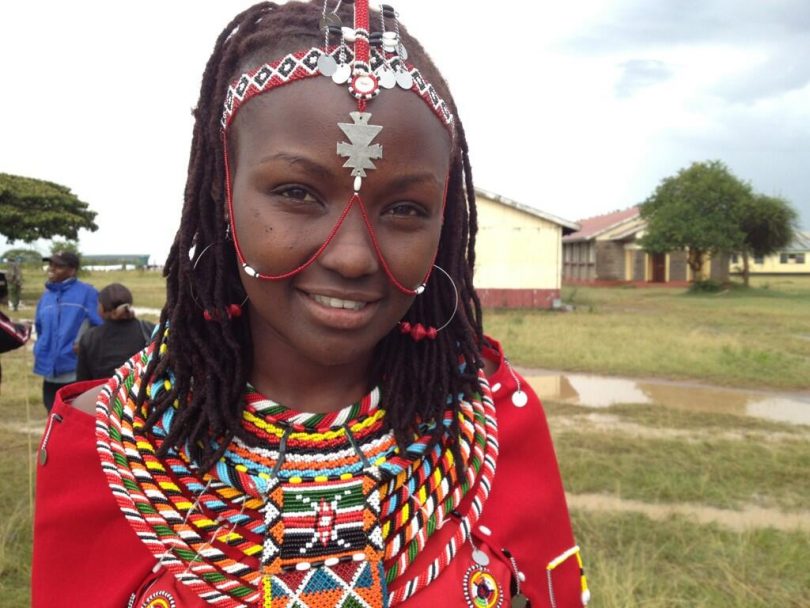This article originally appeared on the Women & Girls Hub of News Deeply, and you can find the original here. For important news about issues that affect women and girls in the developing world, you can sign up to the Women & Girls Hub email list.
By Hannah McNeish
Josephine Kulea has saved over 1,000 girls in Kenya from forced marriage and the female genital mutilation that usually precedes it. Her work has earned praise from Barack Obama, but she says politicians back home won’t support her work in case it loses them votes.
NAIROBI, Kenya – Her face has been plastered across billboards in New York and London and she was lauded by U.S. President Barack Obama on his visit to Kenya. But Josephine Kulea sees herself as still very much a grassroots activist. She works with communities in the area where she grew up, saving girls as young as seven from forced marriage, female genital mutilation (FGM) and either being pulled out of school or never getting the chance to go. Despite national laws banning child marriage and FGM, in Samburu culture, girls can be matched to men old enough to be their grandparents, and polygamy is common.
Once cursed to death by her family for breaking up a marriage between her uncle and a seven-year-old cousin, Kulea, 30, now runs the charity The Samburu Girls Foundation, which, to date, has stopped over 1,000 girls across four counties from marrying young and missing their education. Women & Girls Hub spoke to her about how it all started with her mother and why she became the target of a death curse.
Women & Girls Hub: How did you start helping girls?
Josephine Kulea: I was following in my mom’s footsteps. My mom also fights for girls to go to school within my community because she was taken out of high school to become my dad’s third wife.
Women & Girls Hub: What about your childhood?
Kulea: I finished school but every holiday when I came home there was a new [potential] husband who wanted to marry me. My uncles wanted to marry me off because my dad passed away when I was young. Everyone was over 45 or in their 50s. I was 12, 13, 14, 15. But my mom fought for me.
After I finished school I went to nursing college and came back to work in my village. The first two girls I rescued were my own cousins. The first was a 10-year-old who was supposed to be getting married. Then two days later I got a call to say the same man, my uncle, was going to marry the youngest girl in the family who was just seven years old. She had to go through FGM on the day of the wedding. She got married and two days later we went to get her and arrest my uncle, and that became history in my village. They even had a big meeting to curse me [to death] because it was considered a very bad thing to do.
Women & Girls Hub: How did you feel when you heard about the curse?
Kulea: I knew I was not in the wrong because I was just protecting child rights. I continued getting calls from women from the same village to rescue more girls. I paid their fees with my nursing salary. It was less than $200 a month. I spent almost everything [on the girls’ education] because you have to buy uniforms and books and pens.
Women & Girls Hub: How did the Samburu Girls Foundation come about?
Kulea: In 2012 we started the organization, registering it and making it official like an NGO, so now we can ask people for money. We are now reaching out to four counties – Samburu, Marsabit, Isiolo and Laikipia. The community has donated 15 acres of land. That’s where our girls stay, we have a dormitory and dining room. Safaricom [Kenya’s largest mobile phone company] is coming to build us classrooms soon and we hope to eventually have a fully fledged school because we’re spending a lot of money on taking these girls to schools across the country.
Women & Girls Hub: How many girls have you helped?
Kulea: We’ve rescued over 1,000 girls. We have 300 girls who are directly under our organizational support. When we rescue these girls, the families normally are bitter because they are missing out on the dowry. It is sometimes up to one year until the girls are accepted back [by their families]. We talk to the parents and counsel them and the girls. Eventually we reunite them. Some parents lie to us. They really want to marry them off again, so we tell the girls that they can always come back to us, they can call us and also they become our eyes in the village and they make sure their own sisters, cousins and neighbors are not going through the same thing.
Women & Girls Hub: Is there any sign parents are starting to value educating girls?
Kulea: The problem we have is the villages in these areas have been marginalized for so long. The illiteracy levels are so high: In Samburu county it’s 80 percent. Such communities have yet to understand the value of educating girls.
Women & Girls Hub: The culture of ‘beading’ – when men give young girls beads to “book” them for sex – is this changing?
Kulea: It is dying out around the cities because more people there have embraced education. But there are a few other areas where it is still very common and as much as we try to spread awareness that it’s wrong, people feel it’s still part of our culture. Some girls feel it makes them beautiful because someone has given them these beads.
Women & Girls Hub: What was it like getting mentioned by Obama?
Kulea: It was awesome! It felt nice because sometimes you work so hard, do a lot of work and you think you’re hidden in the bush and no one notices. We are yet to get those shout-outs from the local or county government.



